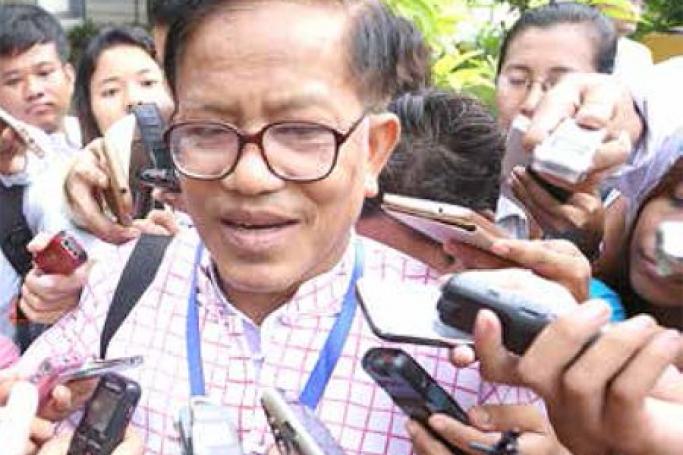Myanmar’s main coalition of armed ethnic groups, the United Nationalities Federal Council, has said it would be “impossible” for a ceasefire agreement to be signed on Union Day, February 12, as proposed by President U Thein Sein. The UNFC has instead called for President U Thein Sein and the leaders of armed ethnic groups to sign an agreement on establishing a federal union on Union Day. The call was made in a statement issued by UNFC leaders at a media briefing in Bangkok on February 2. Mizzima Weekly’s Geoffrey Goddard was at the briefing and later spoke to UNFC vice chairman (1), Nai Hong Sar, who is also vice chairman of the New Mon State Party, about the peace process.
What is the UNFC’s strategy in calling for an agreement on establishing a federal union to be signed on Union Day?
The President and [the government’s chief negotiator in the ceasefire talks) U Aung Min are calling for the signing of the nationwide ceasefire agreement on the forthcoming Union Day, February 12. It is impossible. We believe that by responding in this way the public and the international community will accept it. That is why we would really like it to happen that day, the agreement on a federal union, because it would be possible to reach the NCA without delay. It will be moving forward. The political problems [involving the establishment of a federal union] cannot be solved without the ceasefire. The root cause is the political problems. The political problems cannot be solved without the ceasefire and at the same time, the ceasefire could not prevail without the political resolutions.
Is the UNFC hopeful about regaining the momentum that was lost at the September talks?
We are optimistic about regaining what had been achieved in the negotiations up to and including the August talks, because it is realistic and reasonable. The most reasonable points are in there [the August talks result].
On the government side, who is calling the shots in the ceasefire negotiations: is it the government or the Tatmadaw?
The Tatmadaw. The Tatmadaw is more important than others because the decision is mainly rooted in the Tatmadaw. If the Tatmadaw dislike [what is achieved in the negotiations] it will be difficult to make progress.
What does the Tatmadaw gain from being an obstacle to peace in Myanmar?
The benefits for the Tatmadaw of being an obstacle to the peace process is that they will be able to maintain their power and their own business opportunities. It is protecting their interests. This is why the Tatmadaw opposes changes to the constitution. As long as this constitution prevails, it is protecting the interests of the Tatmadaw.
Is the UNFC concerned about the possible implications for the ceasefire negotiations of a change of government after the election?
Of course. The election has great implications for the negotiations. If President Thein Sein could be able to achieve the peace with us, he will gain more power from the public and he may extend his role and gain more power.
Do you expect the two main Bamar parties, the USDP and the NLD, to make the signing of a ceasefire agreement an issue in their election campaigns?
Inevitably they will have to use this issue in their election campaigns because they want peace in the country as well. They will use it in their election campaigns.
Why did you decide to give this media briefing outside Myanmar?
We want the international community to know the reality of the [peace] process. With the transformation of the country and the changes, this understanding of the truth, the facts, are very, very important. That is why we would like to reach a wider audience.
You are viewing the old site.
Please update your bookmark to https://eng.mizzima.com.
Mizzima Weekly Magazine Issue...
14 December 2023
Spring Revolution Daily News f...
13 December 2023
New UK Burma sanctions welcome...
13 December 2023
Spring Revolution Daily News f...
12 December 2023
Spring Revolution Daily News f...
11 December 2023
Spring Revolution Daily News f...
08 December 2023
Spring Revolution Daily News f...
07 December 2023
Diaspora journalists increasin...
07 December 2023
Tatmadaw and Arakan Army are in talks












